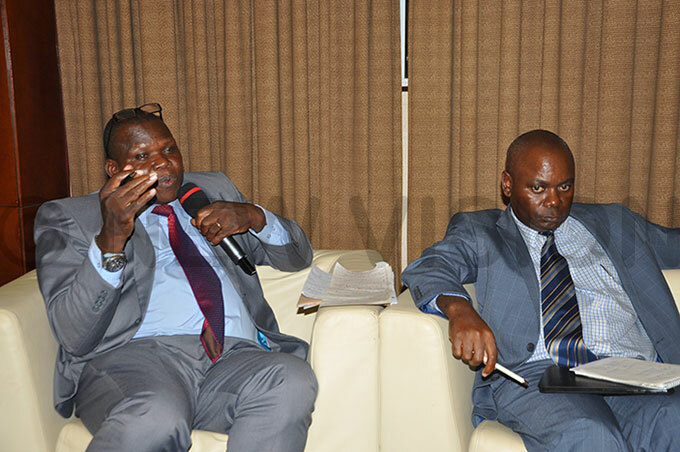Growing economy is leaving out the masses - experts
Ngobi said the share of the working population in the formal sector businesses is very small standing at only 3%, the share in formal sector manufacturing is even smaller, a negligible 0.7%.
BUSINESS ECONOMY
Economic experts have argued that while it was good that the economy was growing at a high rate, many Ugandans were not benefiting from it and have been left jobless.
Ramadhan Ngobi, an economics lecturer at the Makerere University Business School said there has been economic growth without transformation because the bulk of Ugandans are still self-employed and in agriculture.
Ngobi said the share of the working population in the formal sector businesses is very small standing at only 3%, the share in formal sector manufacturing is even smaller, a negligible 0.7%.
This was during a public dialogue organised by the Makerere University Business School Economic Forum and the Friedrich-Ebert-Stiftung on the topic ‘Budgeting for economic transformation and social inclusion'. The dialogue took place at the Serena Hotel, Kampala.
"Uganda has the largest rural population in East Africa standing at 82%. Urban informal sector accounts for nearly half of GDP (42%), the second highest in East Africa after Tanzania.
Only 22% of Ugandans, on average, have access to electricity. Uganda has low death rates but high birth rates.
Ngobi said the economic growth profile has remained jobless where for every one job advertised there are 500 applicants.
"Incomes have not kept pace with the GDP growth, there is rising inequality, there is low competitiveness of the economy, there is too much private sector and too little government participation in the economy," Ngobi said.
He said a transformative budget is one that invests in sectors that encourage structural change towards higher productivity sectors and jobs; it invests in technological upgrading to achieve productivity growth within sectors such as irrigation and fertiliser or industrial upgrading.
He added that a transformative budget employs an industrial policy that takes explicit account of job quality, quantity and access, invests in improved education quality and training.

Mukitale speaking during the dialogue while Muhumuza looks on. (Photo by John Odyek)
It also is concerned with micro-level, rather than macro-level transformations, it invests in social protection services, increases access for disadvantaged, vulnerable and other groups of society to economic opportunities.
Kenneth Mugambe, Director Budget said the lack of absorption capacity in some sectors or institutions was not because the funds were not needed but because of challenges like lack of contracts and management problems.
"Absorption capacity is what distinguishes developed and developing countries because they have managed to solve the absorption capacity puzzle," Mugambe said.
Dr. Fred Muhumuza, an economic expert said a lot of funds were going to security which hinders progress into funding for activities that can lead to transformation.
Muhumuza said the interest payments required to pay for loans obtained in the past were high and taking big chunks of the budget.
He said some of the interest payments were being rolled over into the following year because the government could not pay them. He said annually the interest payments were estimated at sh3trillion and sh6 trillion were rolled over into the next year.
"Because of the past decisions of politicians on the budget, the hands of technocrats in the ministry of finance are tied. They cannot design a budget that leads to transformation. The budget is locked in the sins of the past.
He said between 1986 to 1996 the budget was concentrating on reconstruction. He said thereafter there was economic growth which was not benefitting the poor.
Stephen Biraahwa Mukitale, the Member of Parliament Buliisa county said there was need for dialogue on many issues in the country to avoid getting into unnecessary conflicts. Mukitale said it was wrong for the government to give 100% control of the sugar industry to Indian investors.
He said this had left the majority people in sugar growing areas such as the Busoga, Bunyoro region poor and slaves to sugar growing.
Mukitale queried why government continues to import furniture from Malaysia when Ugandans can supply it. He noted that Uganda was producing excess which was not consumed which he suggested should be distributed freely to be consumed because it was being paid for.
"Only 23% of Ugandans access power. Those who have no access to power contribute to depletion of forests in search of biomass energy. We are paying for thermal power which we do not consume. Why don't we prioritise connecting everyone to consume freely," Mukitale said.
He said the government should focus on agro-processing given that there was plenty of power being produced.
Patrick Birungi, executive director Uganda Development Corporation said he has learned from his experience working at the National Planning Authority that planning is easier than implementation. "When you plan it is easy but when it comes to implementation, the forces are different," Birungi said.
Birungi proposed that government should identify projects that are transformative. He noted that spending on big programs which take huge chunks of the budget contribute to little transformation.
"We should focus on projects that transform communities, focus on the entire system across the value chain then it can lead to change," Birungi said.
He noted that the national budget is fragmented without different activities scattered.